




























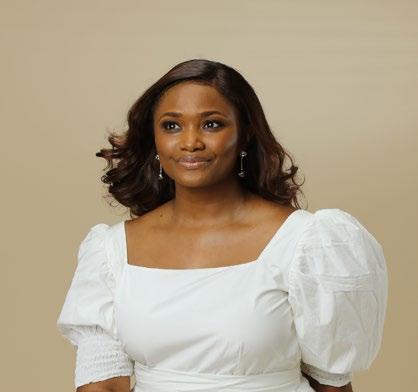





Michelle Dede’s story of how she became an actor is one of fate. If you were to ask her, she would tell you that she accompanied a friend of hers to Lagos in early 2014 for Ebony Life TV’s Desperate Housewives Africa auditions and became her scene partner while she was rehearsing to memorise lines for different scenes. Her friend tried convincing her to attend the auditions with her, but Dede refused. After about two weeks of convincing, she reluctantly agreed to attend the auditions without intending to go ahead, but her friend had other plans. Upon arrival at the auditions, she filled out a form for herself and one for Dede. Dede eventually auditioned––nervous and unsure of what she was doing, but the casting directors praised her audition. A few months later, Dede and her friend were called back for the second stage of the auditions, after which they didn’t hear back from them till October 2014, when one of the series producers called and offered her a lead role. Dede says it was baptism by fire, and if not for two cast and crew members who kept encouraging her, impostor syndrome and self-doubt would have got the better of her. By the time the series aired in 2015, she was more confident as an actor, and well, look at her today.
Read Michelle Dede’s story on pages 8 to 10.
#Unshakable Truths this week raises a pertinent topic. Sally discusses The Will—not THEWILL, as in this magazine, but Will, as in a document released upon a person’s death that specifies what should be done with their estate. It got me wondering how old one ought to be to write a Will.
Do you have a Will?
Until next week, enjoy your read.







SUNDAY, JANUARY 26, 2025





SUNDAY, JANUARY 26, 2025



ANOTHER CONTROVERSIAL CONTRACT
BY AMOS ESELE
Fifty-Two years after it was conceived by the Federal Government in 1972 as a 3,050MW hydroelectric facility to help realise the goal of 23,000MW installed capacity by 2023, the Mambilla Hydroelectric Power Project in Taraba State, is now a subject of arbitration over an alleged failed contract and litigation for alleged fraud. At the centre of the arbitration in Paris, France, are two former presidents, Olusegun Obasanjo and Muhammadu Buhari. At the centre of litigation by the Economic and Financial Crimes Commission, EFCC, are two former Ministers of Power who served under both former Presidents, Olu Agunloye (2002 -2003) and Saleh Mamman (2019-2021).
“The appearance of the two former Nigeria’s Presidents, Olusegun Obasanjo and Muhammadu Buhari before the International Chamber of Commerce to testify on the botched Mambilla Power plant deal underscores significant scrutiny surrounding major infrastructural projects in Nigeria and their implications for governance and accountability,” Executive Director of Rule of Law, Accountability Advocacy Centre, RULAAC, Mr Okechukwu Nwanguma, told THEWILL on Friday.
Nwanguma said that the case highlights past decisions and mismanagement that have impeded the country’s energy development, impacting productivity and economic growth.
Indeed, the World Bank’s Power Recovery Programme, PSRP, estimates that Nigeria’s businesses lose $29 billion annually due to unreliable electricity The global bank, which is helping the country improve its electricity access through the Nigeria Electrification Project, NEP, estimates that, because of the prevailing challenges, the electricity deficit is about 40 per cent nationwide, while 73 per cent of the rural population is off the national grid.
Moreover, the International Hydroelectric Power Association, which says hydro-electric power is the largest single source of renewable energy providing more than 90 per cent of all stored energy in the world, has disclosed that countries like Egypt, South Africa and Morocco which started similar hydroelectric power plants like Nigeria have been able to inject between 16,000 to 22,003 hydroelectric power into their overall generating capacity and increased their mega wattage to between
59,003 for Egypt and 58,095 for South Africa.
Currently, Nigeria has 12,000 installed power generating capacity with only 5,000 output, managed by inefficient GenCos, plagued by decayed infrastructure and dogged by vandalism leading to regular grid collapse and blackouts.
Nonetheless, a dependable source at the EFCC, who spoke to THEWILL on the condition of anonymity, said the steps taken by both former presidents unconditionally were commendable for purposes of due process and transparency, though connected, “the litigation by the commission against the two ex-Ministers regarding alleged fraud connected to the Mambilla Power project, were different litigation from that which both former presidents are handling.”
FORMER PRESIDENTS OBASANJO, BUHARI IN PARIS
Following a $2.3 billion arbitration proceedings against Nigeria by Sunrise Power and Transmission Company Limited at the International Chambers of Commerce, ICC, in Paris, France, former Presidents Obansanjo and Buhari travelled to the French capital last week to testify in an alleged breach of contract by the Federal Government of Nigeria. Mr Leno Adesanya, is the founder of Sunrise Power Company. Sunrise Power claims to have been awarded a $6 billion contract to build, operate and transfer the Mambilla power plant by the Olusegun Obasanjo Administration in May 2003. Also, it alleged a breach of contract by the Nigerian government for which it is seeking monetary compensation of $2.3 billion to cover what it had spent on financial and legal consultancy. Buhari returned to Nigeria on Friday, according to a video shared by an aide, Bashir Ahmed. Obasanjo, who was also in Paris on Friday, said he had testified before the ICC. According to Obasanjo, “I volunteered myself to testify in this case. Nobody sent me to do so. President Tinubu did not ask me to do so as speculated. I didn’t speak to anybody on my intention to testify,” Mr. Obasanjo said, in an interview with Premium Times from Paris.
“I decided to testify because of the statement made on the matter by Olu






the Mambilla project between November 2002 and May 2003, when he became Minister of Power. He denied granting the authority to award the contract for the power project and asked Agunloye to publicly disclose who authorised the contract, thereby raising the question of fraud. In his defence, Agunloye noted that the $6 billion Sunrise Power needed to complete the project was valued by four predecessors and Obasanjo before he himself was appointed Minister of Power. He insisted that Obasanjo gave approval for the project.
The former President in a reported memo to the Attorney General and Minister of Justice, Lateef Fagbemi, a Senior Advocate of Nigeria, noted that he had no objection to Agunloye’s request but asked him “to bring a memo to Council to include comparison with coal-fired plant for 4000MW to 5000MW”.
“What is abundantly clear is that at no time did Dr Agunloye comply with the foregoing directive by bringing a memo to Council to include the [stated] comparison, nor can my directive be stretched to be inclusive of any approval to award any contract to Sunrise Power and Transmission Company Limited or any other person.” According to Obasanjo, ministers had no authority during his administration to commit Nigeria to contracts beyond N25 million without presidential approval. He described Agunloye’s transaction with Sunrise Power as fraudulent, deceitful and embarrassing.
Moreover, Agunloye’s successor in the Ministry, Senator Liyel Imoke, reportedly denied government’s approval for the project, thus supporting Obasanjo’s position. According to reports, Senator Imoke’s denial was contained in a reply to a letter by a Sunrise Power Director, Engr Tunde Akinbode, seeking the payment of N6 billion for “pre-EPC development of Mambilla.”
Engr Akinbode, in the letter dated August 20, 2003, said the Federal Government’s commitment of N6 billion, as contained in Agunloye’s contract award letter with ref. no FMP/S/6145/S.T/2, was “not enough” and “there will be a need for the government to budget an additional N10 billion in the next budget year.”
Senator Imoke, in his reply dated September 3, 2003, said, “This is to inform you that the Federal Executive Council did not approve the Memorandum recommending your Company for the Mambilla Hydroelectric Power Project. In line with the directives of the Federal Executive Council, the Federal Ministry of Power and Steel is to revisit the development of the project. Fresh documentation will be made available to all prospective developers in due course… you are advised to tender for the project when it is advertised.”
BUHARI AND MAMMAN
Desirous of sustaining the momentum on the project, former President Buhari approved the constitution of two committees for the Mambilla Power Project in 2020, namely, the Inter-ministerial Steering Committee and Project Delivery Committee. The Minister of Power, Saleh Mamman, chaired the inter-ministerial steering committee, while the director in charge of Renewable Energy in the Federal Ministry of Power chaired the project delivery committee.
According to the then Special Assistant to the Minister of Power on Media and Communications, Aaron Artimas, members of the Inter-ministerial Steering Committee were representatives of Federal Government agencies and Taraba State government as well as federal ministries of Water Resources, Environment, Finance, Budget and National Planning, Works and Housing, Justice, Information and Culture, and Mines and Steel Development.
Others included representatives of the Secretary to the Government of the Federation, National Security Adviser, Nigeria Sovereign Investment Authority and the Nigeria Customs Service. The terms of reference of the Inter-ministerial Steering Committee included facilitating and fast-tracking the execution and project delivery of the Mambilla hydroelectric power project.
They were to also obtain approval of the loan facility from the China Exim Bank for the offshore component of the project based on the reviewed contract price. Before this time, Sunrise Power was fuming because the government had since re-awarded the project to Chinese companies. The engineering, procurement and construction contract for the power project was awarded to a joint venture between China Gezhouba Group, CGGC, a subsidiary of the state-owned China Civil Engineering Construction Corporation, CCECC; Sinohydro and CGCOC, formerly CGC Overseas Construction, in November 2017.
Miffed by this turn of event, Sunrise Power sued the Federal Government at the International Court of Arbitration in France, in October 2017, for unlawful termination of contract. Adesanya’s company argued that Nigeria failed to honour its contractual obligations and sought s $2.3 billion in compensation against Nigeria, claiming it had spent millions of dollars on financial and legal consultants before the contract was cancelled.
The international court awarded Sunrise Power $200 million against Nigeria for breach of contract. In 2020, Nigeria entered a settlement agreement with the company. Buhari then directed the Nigeria Sovereign
Investment Authority to source the $ 200 million for the settlement of the court award in favour of Sunrise Power after which it is expected to relinquish all claims to the project. The government explained that the challenge of COVID-19 affected its finances, said Atimas. On September 1, 2021, Buhari fired Minister of Power, Mamman, alongside the Minister of Agriculture and Rural Development, Mohammed Nanono, claiming that he “found it essential to reinvigorate this cabinet” after a process of “independent and critical self-review.”
The Muhammadu Buhari Administration then withheld payment of the $200 million on the advice of Abubakar Malami, the former AttorneyGeneral of the federation who also told Adesanya of the government’s decision to terminate the agreement.
that failed to show up is a Senegalese lady, allegedly offered to Abubakar Malami, to induce him to sign the 2020 settlement agreement. EFCC, AGUNLOYE, MAMMAN, ADESANYA
The EFCC source confirmed to THEWILL that though the EFCC last Thursday amended charges against Agunloye, the anti-graft agency is yet to serve him the ammended charges. Justice Jude Onwuegbuzie of the Federal High Court, FCT sitting in Apo, Abuja last Thursday, January 23, 2025 granted the prayers of the EFCC to amend charges brought against Olu Agunloye and make him take his plea. Agunloye is standing trial by the EFCC on seven-count charges, bordering on official corruption and fraudulent award of Mambilla Power Project contract to the tune of $6billion.


Unrelenting, Adesanya approached the International Chambers of Commerce in Paris, asking for a second arbitration, in addition to the one initiated in October 2017. In this second arbitration, the company is asking for a $400 million settlement, regarding the failure of the Nigerian Government to honour both parties’ agreement entered into in 2020 to end arbitration.
WHY OBASANJO, BUHARI HAD TO TESTIFY
At the arbitration hearing in Paris, the Nigerian Government had put up a robust defence, alleging fraud and corruption on the part of its public officials in the award of the contract. It likened the Mambilla contract to the P&ID gas project which it successfully proved in court was fraudulently awarded.
Although Buhari arrived Nigeria from Paris on Friday evening and kept mum over his appearance, Obasanjo said he went to Paris willingly to testify before the ICC. The idea, THEWILL learnt, was designed to maintain the country’s position that the 2003 power contract was riddled with fraud.
Efforts by THEWILL to reach Mr. Femi Adesina, former Special Adviser on Media and Publicity to the former President and Senior Special Assistant, Media and Publicity, Mallam Garba Shehu, proved abortive as phone calls to their phones were not answered or returned. A source, however, told this newspaper that Mallam Shehu was in Paris with Buhari. The Presidency, however, had washed its hands off reports that it directed any of the former Presidents to appear and testify before the ICC in Paris. This, however, does not mean it failed to keep a tab on every development in the case.
SUNRISE POWER DESERTED AT PROCEEDINGS
Reports of the arbitration proceedings at the ICC last week showed that only witnesses from Nigeria testified from Monday, January 20 through Thursday, January 23, 2024, when the event ended. Thus, while Obasanjo, Buhari, former Power, Works and Housing, Babatunde Fashola and his Water Resources counterpart, Suleiman Adamu, testified as actual witnesses, those listed as witnesses by Sunrise Power failed to show up.
The Cable, which covered proceedings, said “For Sunrise, promoted by Leno Adesanya, its key witness failed to show up to adopt their statements, meaning their statements are deemed abandoned and of no moment.” Agunloye also failed to show up. So, too was a former Attorney-General of the Federation, Michael Aondoakaa who was listed as a witness by Sunrise. The on-line medium said, “he showed up briefly in Paris and returned to Nigeria without testifying.” A third witness listed by Sunrise
What is abundantly clear is that at no time did Dr Agunloye comply with the foregoing directive by bringing a memo to Council to include the [stated] comparison, nor can my directive be stretched to be inclusive of any approval to award any contract to Sunrise Power and Transmission Company Limited or any other person
Earlier on July 1, 2024, the Prosecuting Counsel, Abba Mohammed, SAN, drew the attention of the court to the amended charge, urging the court to accept same and cause the defendant to take his plea, relying on the provision of Section 216 and 217 of the Administration of Criminal Justice Act, 2015. However, defence counsel, Adeola Adedipe, SAN, objected to the plea, arguing that the leave of the court must be formally sought and obtained before the EFCC can amend its charge .
Responding, the court directed all parties to furnish the court with authorities in support of the argument canvassed to which the EFCC made reference to the Court of Appeal’s decision in Bovoa v FRN & Anor (2017) During Thursday’s ruling, the judge held that amendment was not intended to overreach the defendant and cause injustice to him and that a court may permit an alteration or amendment to a charge or framing of a new charge at any time before judgment is pronounced. Justice Onwuegbuzie adjourned the matter to February 3, 2025 for the defendant to take his plea.
The EFCC alleged that on May 22, 2003, Agunloye awarded a contract, titled “Construction of 3,960MW Mambilla Hydroelectric Power Station on a “Build, Operate and Transfer Basis” to Sunrise Power and Transmission Company Limited, without any budgetary provision, approval or cash backing.
The former minister was also alleged to have on August 10, 2019, corruptly received the sum of N3.6m from Sunrise Power and Transmission Company Limited, and Leno Adesanya for having conveyed the ‘approval of the Government of the Federal Republic of Nigeria for the construction of the 3,960 megawatts Mambilla Hydroelectric Power Station’ in favour of SPTCL, which was done without the approval of the Federal Executive Council.
Claiming that Sunrise’s Adesanya had bribed a former Minister to secure the contract, the EFCC in February 2024, declared Leno Adesanya, promoter of Sunrise Power and Transmission Limited, wanted for “an alleged conspiracy and corrupt offer to public officers”.
Adesanya was mentioned in three of seven count charges against a former Minister of Power and Steel, Olu Agunloye, who is being prosecuted by the EFCC over the $6bn Mambilla hydropower contract. Agunloye was arraigned on seven charges, bordering on the fraudulent award of a contract and official corruption in January 2024. Adesanya however pleaded not guilty to the charges.
For Mamman who is being prosecuted by the EFCC on a 12-count charge bordering on conspiracy to commit money laundering to the tune of N33.8 billion, his trial got complicated last Wednesday at the Federal High Court, Abuja, when the EFCC presented its eight witness before Justice James Omotosho.
The witness, PW8 Abdullahi Suleman, a bureau de change operator, narrated how more than N22 billion was allegedly siphoned from the Federal Ministry of Power, while Mamman was minister. He said the naira equivalent of the money was exchanged for United States dollars through his business accounts.
When shown Exhibit X series, which contained bank statements generated from his companies showing evidence of money inflows into his bank accounts with Strong Field international Projects Limited, Mintedge Nigeria Limited, Prymint Investment Limited, the witness admitted that they were the accounts he gave Maina Goje, an official of the Federal Ministry of Housing to whom he was directed to always give any amount of dollars he requested.
Among some of the notable transactions shown to him on the accounts were; N285,983,285 received on 24th May 2021; N278, 248.611 on 26th May 2021; N320m on 1st January, 2021; N184m on 18 June, 2021; N178,300,285 on 14th July 2021; N75,420, 000 on 5th August 2021; N75,120,000 on December 1, 2021; N68,150,620 and N70,650 on 15th December 2021; N90,247,395 on 12th Jan 2022; N64, 747,627 on 16 February 2022, among others and he agreed receiving them.
The judge adjourned the matter to 23 January, 2024 for continuation of hearing. “Hopefully, the testimonies by the former Presidents will provide insights into eh government’s handling of such critical projects and the ramifications of international partnerships,” said RULAAC’s Nwanguma, adding, “Ultimately, this situation emphasizes the need for transparency and due diligence in Nigeria’s efforts to develop its energy sector, aiming to restore investor confidence and avoid future pitfalls.”
President Bola Tinubu (2nd Left), cutting the tape to commission the Bola Ahmed Tinubu Barracks, Asokoro in Abuja; with him is the Chief of Army Staff, Lt.-Gen Olufemi Oluyede (left) and other dignitaries on Janury 23, 2025.

BY AMOS OKIOMA
Youths of host communities in the Niger Delta region have expressed outrage over what they describe as the lacklustre response of the NNPCL/SPDC Joint Venture (JV) to last week’s fire outbreak at Wellhead 008, located in Buguma, Asari-Toru Local Government Area of Rivers State.
The youths, under the aegis of the Host Communities of Nigeria Producing Oil and Gas Youth Council, accused the JV of negligence and failure to maintain critical infrastructure, which they say contributed to the devastating incident.
President of HOSTCOM Youth Council, Comrade Fiawei E. Pathfinder, condemned the alleged indifference of the NNPCL/SPDC JV, noting that the fire outbreak could have been prevented with regular maintenance of oil pipelines and infrastructure, especially in the saltwater swamp areas where the facilities are located.
“The fire incident, which has left Buguma and its environs in a terrible state, is a direct result of the negligence of the NNPCL/SPDC JV,” Pathfinder said. “These pipelines and oil facilities, which have been laid for decades, are corroded due to exposure to harsh environmental elements. Regular maintenance could have averted this tragedy.”
He added that the slow reaction of the JV created an opportunity for vandals to exploit the situation, further complicating matters.
Pathfinder lamented that despite the enormity of the fire and its impact on the livelihoods of the Buguma people, the NNPCL/SPDC JV failed to deploy an emergency response team to assess the damage and address the situation.
“This despicable attitude towards the Buguma community and the entire Kalabari Kingdom is unacceptable. It is clear that the decay of oil infrastructure and the JV’s negligence are the root causes of this incident,” he added.
In a strongly worded statement, HOSTCOM Youth Council outlined a series of demands to address the fallout of the fire outbreak.
The group requested, “Immediate steps to salvage Buguma and its environs from further devastation.
“Construction of housing and healthcare facilities for affected communities.
“A panel of inquiry led by experts from the presidency, law enforcement, and the Federal Ministry of Justice to investigate the incident and its causes.
“Punishment for anyone found culpable, as well as a thorough remediation of the environment.
“ Immediate maintenance and replacement of decayed pipelines and infrastructure.
“Adequate compensation for all affected community members.
“Povision of pipe-borne water for Buguma and surrounding communities.”
Pathfinder warned that the council would take decisive action if their demands are not met. “At this juncture, we boldly state that if our demands are ignored, we will take drastic steps after due consultations,” he said.
The relocation of the Edo State Governorship Election Petitions Tribunal from Benin City to Abuja, as announced by the tribunal secretary has been hailed as a decisive and positive development in the journey toward justice. The Edo State Governorship Election Petitions Tribunal announced its relocation from Benin City to the Federal Capital Territory, Abuja, at the weekend. A notice dated January 24, and signed by the Secretary, Mu’azu Ibrahim Bagudu, Esq., the tribunal informed parties in the case, that its proceedings will now be held at the National Judicial Institute (NJI), Abuja.
“I am directed to notify all parties that the Governorship Election Petition Tribunal sitting in Benin City, Edo State, has been relocated to Abuja at the National Judicial Institute (NJI), Airport Road, Abuja, effective from Monday, 27th January 2025”, the notice partly read.
Team Asue Media Organization (TAMO) in a statement signed by Erhabor Emokpae on Friday night in Benin City, said while the reason for the relocation has not been officially stated, “it is clear that this move, one we welcome, ensures a more secure and neutral environment for the proceedings, free from the pressures and tensions surrounding the tribunal in Edo State.”
TAMO added that “In line with our continuing commitment to truth and justice, this relocation is a reaffirmation of our firm belief in the judiciary’s dedication to fairness and transparency.
“Since the fire outbreak, SPDC/NNPCL has not paid any attention to the affected communities. They have shown no concern for the devastating effect the incident has had on the people, whose fishing activities and other means of livelihood have been crippled,” he said.
He accused the JV of neglecting the Kalabari Kingdom, a major oil and gas-producing region that significantly contributes to the nation’s economy.
The HOSTCOM Youth Council called on President Bola Tinubu, who doubles as the Minister of Petroleum Resources, to prioritize the plight of the Buguma community and ensure swift action to prevent a recurrence.
The fire at Wellhead 008 has left a trail of destruction, with residents and environmental activists urging prompt intervention to address the underlying issues plaguing oilproducing communities in the Niger Delta.

“By moving the tribunal to the National Judicial Institute in Abuja, the process is shielded from local interference, ensuring that justice will be based solely on evidence and legal merit. “Despite their public bravado, the APC’s recent pattern of obstruction— from preventing BVAS inspections to witness intimidation and threats of violence—has repeatedly shown their only mission: to tilt the judicial scales in their favour and subvert due process.
“This relocation removes any leverage they might have hoped to exert locally, allowing the tribunal to operate in a secure and impartial setting. “We firmly believe that Asue Ighodalo’s case, founded on evidence and meticulous legal preparation, remains unshaken. The overwhelming strength of the petition continues to give confidence to all who value democracy and the rule of law.




L-R: President, Manufacturers Association of Nigeria (MAN), Otunba Francis Meshioye; Director-General, MAN, Segun Ajayi-Kadir; Chairman, Corporate Affairs and Strategic Planning Committee of the association, Mrs Kofo Akinkugbe and MAN Assistant Director, Corporate Affairs and Communications, Segun Alabi, during the association’s Media Presidential Luncheon in Lagos on January 23, 2025.

BY LADI DAPSON, MAIDUGURI
The United Nations Children’s Fund (UNICEF) urged critical stakeholders in the northeast on Friday to use Artificial Intelligence to reduce the out-of-school menace in the region.
The UNICEF Chief of Field Office, Borno State, Joseph Senesie, disclosed this during an event organised to commemorate the 2025 International Day of Education at the University of Maiduguri, Borno State. He lamented that more than half of the children displaced by conflict in North East Nigeria are out of school.
While delivering his speech on this year’s theme, “Artificial Intelligence (AI) and Education - Preserving human agency in a world of automation”, Senesie pointed out that despite the wide embrace of education in Nigeria, there is still a huge gap to be filled, particularly in rural communities where there is lack of access to quality education Senesie called on government and nongovernmental organisations to embrace the change that comes with technology through proper funding and investment
“I want to take this opportunity to call on all, both the government and partners, to embrace the change that comes with Technology and make it worth pushing forward by allocating sufficient resources for digital learning. As the world evolves, digital platforms become crucial avenues for increased access to knowledge and skills acquisition, which is mandatory for a better future.
“While every International Day of Education allows us to look at how far we have come, we cannot lose sight of the huge gaps that still exist in reaching the most disadvantaged children in rural communities with quality and inclusive education.
“As of today, more than half of all displaced children in Northeast Nigeria are out of school. For many children, the right to education

President Bola Tinubu has asked the Senate to confirm the appointment of Captain Chris Najomo as substantive Director-General of the Nigerian Civil Aviation Authority.
Although the appointment has not been officially announced, sources in the Aviation Ministry with knowledge of the development confirmed that Tinubu approved Najomo’s nomination as substantive DG following a recommendation by the Minister of Aviation and Aerospace

has still not translated into the right to learn”, he said.
According to him, the International Day of Education is observed annually across the globe on January 24th and provides an opportunity for reflection on the pivotal role of education in fostering global peace and sustainable development.
He further noted that UNICEF is partnering with the Borno state government to ensure access to quality education and the incorporation of technology into modern learning
“In the past two (2) years (2023-2024), UNICEF in collaboration with the Borno State Government supported Technological Initiatives that enhanced digital learning through the introduction of the Nigeria Learning Passport (NLP).
“Over 30,000 teachers across the 18 states are trained in digital literacy and pedagogical skills. In Borno state alone, more than 102 teachers, with 38,657 learners have enrolled and actively registered in at least one course on the platform”, he added. He reiterated UNICEF’s commitment to supporting the education of children who are affected by the over a decade of insurgency in Nigeria
“UNICEF will continue to work with the Government, donors and other partners to raise the bar in terms of providing safe and quality access to education for girls and boys affected by conflict in Nigeria.”
On his part, the Borno State Commissioner of Education, Lawan Wakilbe, called on students to find opportunities in technology and embrace it in their day-to-day activities.
“The future is technology. Every sector today has Incorporated technology in one way or the other. Therefore, as leaders of tomorrow. You must start embracing and using it in your pursuit of excellence”, Wakilbe stated.
Development, Festus Keyamo, SAN.
Najomo has been in an acting capacity as NCAA DG since his appointment on December 13, 2023, following the suspension of Capt. Musa Shuaibu Nuhu.
THEWILL reports that his appointment as substantive Director-General has been communicated by Tinubu in a letter addressed to Senate President, Godswill Akpabio.

The House of Representatives has postponed the resumption of plenary earlier scheduled for Tuesday, January 28 to February 4, 2025.
Spokesman of the House, Akintunde Rotimi, announced the development in a statement on Friday.
He said the postponement is necessary to allow committees sufficient time to conclude ongoing budget engagements and defences with Ministries, Departments, and Agencies.
The statement read, “The House of Representatives has announced the postponement of its plenary resumption, previously scheduled for Tuesday, January 28, 2025. The new date for resumption is now set for Tuesday, February 4, 2025.
“This development was communicated to Honourable Members through an internal memorandum issued by the Clerk of the House of Representatives, Dr. Yahaya Danzaria, Esq., on the directive of the House Leadership.
“The postponement is necessary to allow committees sufficient time to conclude ongoing budget engagements and defences with Ministries, Departments, and Agencies (MDAs). This measure ensures a thorough approach to legislative responsibilities.
“The house remains committed to fulfilling its legislative mandate for the benefit of Nigerians and appreciates the understanding of all stakeholders.”

BY ABDULLAHI YUSUF
The Kano State Government has rejected a security alert issued by the state police command, declaring that the National Tijjaniyya Maulud will proceed as planned despite warnings of a potential terrorist attack on public gatherings.
The Kano State Police Command had earlier raised a public alert, citing intelligence reports about suspected terrorists targeting key locations in the state.
However, the state government dismissed the warning, accusing federal security agencies of attempting to disrupt the long-standing religious event.
Addressing journalists at the Emir’s Palace on Friday evening, the State Commissioner for Information and Internal Affairs, Ibrahim Waiya, reassured the public that the Maulud would hold as scheduled at 8 a.m. Saturday at the Kofar Mata Stadium.
“This religious gathering is organized by a legitimately registered and recognized body, and any attempt to obstruct it would amount to a violation of the citizens’ right to lawful assembly and religious practice in Nigeria,” Waiya stated.
He condemned the presence of security operatives at the event venue, describing it as an unwarranted and unnecessary action.
According to Waiya, the National Tijjaniyya Maulud has been held annually for over 39
years without incident.
“There has been no report of any security threat in Kano State that justifies such extreme measures. The actions of security agencies in blocking the venue are unjustified and unacceptable,” he said.
Waiya reaffirmed the state’s commitment to ensuring the peaceful conduct of the Maulud, emphasizing Kano’s historical role as a center of Islamic scholarship and religious harmony.
“Kano State remains committed to upholding activities that promote peace, unity, and spiritual growth. The Federal Government must withdraw its security agencies from the venue immediately, as Kofar Mata Stadium is a property of the Kano State Government, and there is no justification for any external force to obstruct a legitimate religious gathering,” he said.
The commissioner called on participants to remain calm, law-abiding, and focused on the peaceful observance of the Maulud.
“Kano State has always been a beacon of peace and religious tolerance, and we will not accept any form of intimidation or interference in our internal affairs,” Waiya warned.
He assured attendees of the state government’s commitment to the event’s success and urged all guests to cooperate fully with local authorities to maintain order during the gathering.
BY FELIX IFIJEH
President Bola Tinubu will depart Abuja on Sunday for Dar es Salaam, Tanzania, to participate in the Africa Heads of State Energy Summit on January 27-28, 2025.
A press statement by Bayo Onanuga, Special Adviser to the President on Information and Strategy, stated that the summit, hosted by the government of Tanzania in collaboration with the African Development Bank Group and the World Bank, aims to advance ‘‘Mission 300,’’ an initiative to provide electricity access to 300 million people in Africa by 2030.
In Dar es Salaam, African leaders, private sector leaders, development partners, and civil society groups will strategise to accelerate energy access across the continent.
The summit will provide a platform for sharing knowledge, expertise, and resources to address Africa’s energy challenges.
Discussions will focus on accelerating energy access in underserved regions, renewable energy, energy efficiency, and mobilising private sector investment.
On the first day, at the ministerial level, participating countries, including Nigeria, will present their national energy strategies, termed compacts, detailing their approaches to achieving universal energy access within five years.
On the second day, Heads of State will endorse the Dar es Salaam Energy Declaration, outlining a unified roadmap for Africa’s progress towards the Mission 300 objectives. Tinubu will deliver a national statement reaffirming Nigeria’s commitment to achieving universal access to energy and its leadership role in Africa’s energy sector.
He will also highlight Nigeria’s ongoing clean energy initiatives and its strategy to drive integrated energy delivery in the continent.
Minister of State for Foreign Affairs, Ambassador Bianca Odumegwu-Ojukwu, Minister of Power, Adebayo Adelabu, the Special Adviser to the President on Energy, Olu Verheijen, and other senior government officials will accompany Tinubu on the trip.
The President will return to Abuja after the summit.






BY FELIX IFIJEH
Thereseems to be no end yet to the prolonged leadership crisis in the Labour Party, LP, as the 29-member caretaker committee headed by Senator Nenadi Usman last week rejected the Appeal Court ruling confirming Julius Abure as National Chairman of the party.
The caretaker committee, established by Abia State Governor Alex Otti and LP’s candidate in the 2023 presidential election, Peter Obi, said it would head to the Supreme Court for final arbitration on the matter, warning Abure to stop parading himself as the party’s national chairman.
Governor Otti and Obi, had set up the committee to manage the affairs of the party after they removed Abure and his executive from office.
According to Senator Usman, despite the court ruling, the committee remains in charge of the party’s affairs by virtue of the mandate entrusted to them by stakeholders at an emergency convention held in Aba in September, 2024.
Nevertheless, Abure’s victory at the Court of Appeal in Abuja, also validated the party’s March 2024 national convention held in Nnewi, Anambra State.
The Presiding Judge of the Appeal Court, Justice Hamma Barka, said that a previous judgement delivered on November 13, 2024, in the matter between the Labour Party (appellant) and Chief Olusola Ebiseni alongside the Independent National Electoral Commission as respondents, was still relevant.
Ruling on two separate appeals filed by Senator Esther Usman, the caretaker committee, and Independent National Electoral Commission, INEC, the appellate court held on January 17, 2024 that the Labour Party’s leadership issues were not justiciable.
It ruled that any actions taken outside its jurisdiction were null and void. Consequently, the judgement of the Federal High Court, delivered on October 8, 2024, by Justice Emeka Nwite, was deemed invalid and subsequently struck out.
Rising swiftly in reaction to the ruling, Senator Usman and the National Secretary of the Caretaker Committee, Darlington Nwokocha, criticised the judgement and alleged the Federal High Court lacked jurisdiction, made errors, and violated their right to a fair hearing. They said, “As the duly recognised National Caretaker Committee Chairman and Secretary of the Labour Party, we, on behalf of ourselves and other members, deem it necessary to issue this press release to clarify and set the record straight.
“The Federal High Court lacked jurisdiction and breached the committee’s right to a fair hearing by disregarding their counter-affidavit in the case filed by Abure. “As the duly recognised National Caretaker Committee Chairman and Secretary of the Labour Party, we find it necessary to set the record straight.
“The Federal High Court erred by entertaining the leadership dispute initiated by Julius Abure and violated our rights by failing to consider our opposition to the suit, the statement read.
“The Court of Appeal affirmed that Suit No: FHC/ABJ/ CS/1271/2024, filed before the Federal High Court by Julius Abure, concerned a leadership dispute over which the Federal High Court has no jurisdiction.
“The Federal High Court erred and acted without jurisdiction by entertaining the leadership dispute brought before it by Julius Abure. It also violated our right to a fair hearing by failing to consider our counteraffidavit opposing the suit before it.
“Finally, we wish to remind the public that, on September 4, 2024, the Labour Party constituted a National Caretaker Committee, appointing us as the national chairman and secretary. Both have been diligently and effectively carrying out their duties to the admiration of stakeholders and the entire membership of the party.”
In the meantime, some states exco of the party have hailed the appellate court verdict as the last word on the lingering leadership crisis in the party and called on all stakeholders to embrace reconciliation with the Abure led-National Working Committee, NWC, of the party.
The Ogun State and Nasarawa State excos, have congratulated Abure on the court ruling. Publicity Secretary of the Ogun State chapter of the party, Mr. Tokunbo Peters, commended Abure for his commitment to upholding the party’s ideals and constitution despite recent challenges.
Peters said, “The entire leadership and members of the Labour Party in Ogun State have absolute trust in the ability, competence and capacity of Abure to lead the party to greater heights. His unwavering dedication to the unity, growth and progress of the party is highly inspiring.”
He called on all the leaders of the party to set aside their differences and join others to prepare for the approaching 2027 General Election.
“As a matter of urgency, a fence-mending meeting must be convened between the Abure-led National Working Committee, Peter Obi and Dr Alex Otti to close ranks and chart a way forward for the party,” Mr Peters said.
The Chairman of the party in Nasarawa State, Alexander Ombugu, congratulated Abure and the NEC of the party on the Appeal court victory.
“On behalf of the executives, members and supporters of the Labour Party in Nasarawa State, I wish to congratulate our National Chairman, Barr. Julius
The Federal High Court erred and acted without jurisdiction by entertaining the leadership dispute brought before it by Julius Abure. It also violated our right to a fair hearing by failing to consider our counteraffidavit opposing the suit before it “

Abure, the National Working Committee (NWC), and the entire National Executive Council (NEC) of our great party for the victory at the Appeal Court. The court has reaffirmed Barr. Abure’s leadership, and we are grateful to the judiciary for upholding the rule of law and its integrity. The Labour Party will remain united and focused on promoting the welfare of the Nigerian people,” Ombugu said, adding that all parties involved in the dispute should respect the ruling affirming Abure as the National Chairman.
Ombugu appealed to aggrieved members to set aside their differences for the greater good of the party, saying, “It is our collective responsibility to take the Labour Party to greater heights. I call on all aggrieved members and intending members to join hands with the Abure-led administration as we prepare to rescue Nigeria during the 2027 general election.”
For Obora Ifoh, National Publicity Secretary of the party, the legal threat by Senator Nenadi’s committee is giving the NWC members no sleepless nights. He said in a newspaper interview that the NWC did not “think that any member of the party would go ahead and demand alternative results after the Appeal Court has made a declaratory ruling. We are working to bring everyone together to see how we can move forward.”
Ifoh said that since the recent victory at the courts, the leadership of the party had started strategising to reposition the party with “a lot of programmes since last year that we are pursuing vigorously,” including a new membership drive and the online revalidation of old members, holding of ward congresses by February 2025, all geared towards preparations for the 2027 general election.
Speaking from the sidelines of a meeting of chairmen of political parties with the Chairman of INEC, Mahmood Yakubu, in Abujal last week, Abure told journalists that he was sure that soon “all differences will be put aside and we will again speak authoritatively with one voice and come out stronger and very effective in the political space. There is no political party without some differences; it is a game of interests and there will always be conflicting interests in every political environment.”






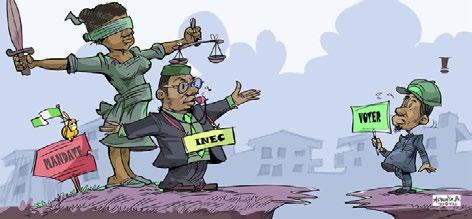











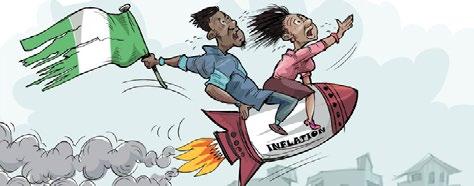
























The recent increase in military attacks against the seemingly invincible terrorists, particularly in the North-East geopolitical zone, is a welcome development.
The last few weeks have been quite challenging and scary for many Nigerians, not only in the banditsinfested North-West where the Nigerian military has concentrated its attacks and firepower but also in the North-East and some parts of the South-East and SouthWest where there is fear of renewed attacks by bandits and terrorists.
There was an upsurge in terror attacks, particularly in the North-East and NorthWest. The audacious manner by which terrorists operated across the geopolitical zones has given the military authorities cause for concern.
In the North-East, terrorists linked to the Islamic State West Africa Province, ISWAP, attacked a military base in Sabon Gida, Damboa, Borno State, killing eight soldiers.
Boko Haram insurgents attacked the Shikarkir community in the Chibok Local Government Area of Borno State and burned down a church and houses.
The murderous attacks extended to Kankara General Hospital in Katsina State where two persons were shot dead and a doctor nearly lost his life. In Kaita Local Government Area of the state, where 30 persons were killed in similar circumstances, the situation is just as bad as the incident in Natsini Village in Argungu LGA of Kebbi where Lakurawa bandits attacked and killed persons and rustled unspecified number of cows.
Other states in the zone, namely Kaduna
and Zamfara, where over 40 persons, mostly children and women were killed, Jigawa which lost 11 people, Sokoto where five soldiers were killed in a military duel with Lakurawa terrorist group, also had their share of the terror.
In another development, two Catholic reverend sisters on Ufuma Road in Orumba North LGA of Anambra State while they were returning from a vocational association meeting in Ogboji.
The Benue State Governor, Hyacinth Alia, disclosed on Thursday that over 1,000 households were displaced in a series of attacks on communities.
Generally, 77 persons lost their lives, with 43 kidnapped, in different terror attacks that took place in 10 states in the last one week. Also, many houses were burnt and more than 1,000 residents were displaced. The situation is so bad that Governor Seyi Makinde of Oyo State had to raise the alarm that intelligence reports showed that terrorists fleeing the war zone in the North-West had infiltrated the South-West.
Addressing these rampant and deadly attacks, the Nigerian military on Thursday said the influx of foreign fighters providing reinforcement to local terror groups in Nigeria, is responsible for the recent resurgence of terrorist attacks in the North-East and North-West.
The Director, Defence Media Operation, Maj. Gen. Edward Buba, stated this while briefing journalists on the operations of the armed forces a fortnight ago.
He said, “These foreign fighters are from the Sahelian Region. The other contributing factor is the local collaborators that form a support

Although he is still at large, the elimination of some of his commanders, including his son and brother sends a strong message that banditry and terrorism is at the receiving end, with a high possibility of defeat and elimination
“
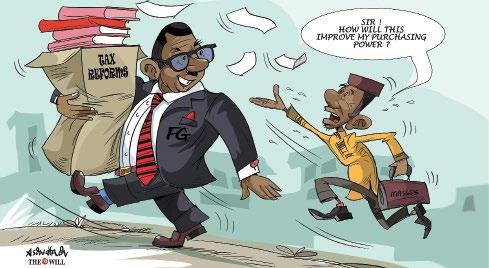



BY JUDE NDUKWE
The Leader of the British Conservative Party and Opposition in the United Kingdom Parliament, Kemi Badenoch, has continued to stir the hornet’s nest with her controversial statements about Nigeria since assuming office recently. She has made what many consider denigrating statements against Nigeria, her country of origin, while exalting the UK, her adopted country.
Nigerians from all walks of life, including Vice President Kashim Shettima, have reacted to Badenoch’s scathing remarks that painted Nigeria as a highly corrupt, economically poor, insecure, destructive and unsafe entity almost not fit for human habitation.
EVERYTHING NIGERIA SUFFERS TODAY IS ARGUABLY A DIRECT RESULT OF THE BRUTISH LEGACIES OF THE BRITISH IN COLONIAL AFRICA
Just as her remarks about the country cannot entirely be dismissed, because a good number of Nigerians, including yours sincerely, have been victims of the brokenness of the country, her flawed and effusive glorification of the United Kingdom, proves that she is either grossly ignorant of Nigeria’s foundational deficiencies or she deliberately chooses to ignore the facts and spew heavily skewed narratives against Nigeria to the advantage of the UK, while feathering her own political nest.
It seems Badenoch is ready and ever willing to play the role of Judas Iscariot: trade Nigeria at whatever cost for the sustenance of her own political ascendancy. That is the angst of many Nigerians who got peeved by her rants.
Everything Nigeria suffers today is arguably a direct result of the brutish legacies of the British in colonial Africa. From the Nembe Kingdom to the Oyo Empire; from the Owa Kingdom to the Benin Kingdom; from today’s Chibok to Calabar; from Zaria to Opobo; from Onitsha to Ife; the nation reeks of British infamous heritage of blood, sorrow, fraud, corruption, outright stealing among other unspeakable vices.
While we agree that our police, and by extension, our political leaders, need to do far better, Badenoch should have focused on her new role as leader of the opposition in the UK to help clean up the heinous history of that country. History shows that our police and political leaders inherited several vices from the British. Such vices include but are not limited to Kemi Badenoch’s Britain holding tightly onto their monumental loot from Africa.
History has it that at a point in Owa Kingdom, highly regarded chiefs of the people were
publicly flogged by the then District Commissioner of Agbor, Offley Stuart Crew-Read, for not providing him with enough eggs, fowls, yam, and water. It was as bad as that. Such a legacy!
In 1897, the British forcefully seized 500 ivory tusks worth over Two Million British Pounds from the Benin Empire after the forced ousting of the then Oba, Ovonramwen Nogbaisi. As of today, the British Museum alone holds around 73,000 valuable cultural objects looted from Africa by the British colonial usurpers. And all efforts to get them to return these looted artefacts back to their original owners in Africa have met with a brick wall. Even though former colonial usurpers like France and Germany have enacted new laws to facilitate the return of these looted artefacts back to Africa, Britain has stubbornly held on to them and refused to follow in the footsteps of France and Germany as they have refused to amend the criminal British Museum Act of 1963 and the National Heritage Act of 1983 which prevent British institutions illegally holding these artefacts from returning them.
Is Kemi Badenoch not ashamed of these facts concerning Britain? Does she not feel embarrassed that the world’s largest diamond known as the Star of Africa which weighs a whopping 530 carats and is set in the British royal sceptre with which King Charles III was crowned in May 2023 and still holds to date, was stolen from Africa in 1905 by the colonial British usurpers? Does she not cringe or get flummoxed knowing full well that a similar piece of diamond also stolen from Africa by British colonial masters, even though smaller, is also set in the Imperial State Crown worn by British monarchs on ceremonial occasions? How does she feel knowing that the highly revered British monarchs are crowned with a sceptre and a crown emblazoned with stolen jewels from Africa? How does she feel seeing her king/queen flaunting stolen pieces of diamond with shameless relish before the entire world in the name of royalty?
It was the same crown and sceptre emblazoned with looted diamonds from Africa that the British crowned the late Queen Elizabeth with 70 years ago. How come Britain still holds on to stolen property from Africa for so long with such impunity and still crowns their monarchs with the items right in the full glare of the whole world while a certain Kemi Badenoch continues to play the ostrich?
Can there be anything more shameless than that? Can there be any other message so poignant yet so pungent than that? One can only imagine what would have happened if the tables turned and an African Head of State was crowned with jewels stolen from the West! That act alone is a loud and clear indisputable indication that the West does not really care about Africa but only about itself. They still hold on to other stolen artefacts looted from
BY UGOCHUKWU UGWUANYI
With public officials’ impulsive indulgence in all manner of wasteful and corruption-prone expenditures, Nigerians seem to have become inured to the devil-may-care squandermania that characterises government dealings. A good number of citizens were, however, jerked from this state of suspended animation by the insensitivity of an austerity-advocating government seeking to spend N8 billion on public enlightenment towards the timely payment of electricity bills! This became common knowledge on Monday when the Minister of Power, Adebayo Adelabu appeared before the National Assembly to defend his ministry’s 2025 budget.
Highlighting the need for many Nigerians to understand that electricity is not a free resource, the Minister said, his ministry is poised to conduct the campaign through multiple media platforms, including social, digital and print, to effectively reach Nigeria’s diverse population of over 200 million. The furore generated by the planned spending shows that the country has hit a new nadir when it comes to the frittering of public resources. It was so absurd that even social media couldn’t resist trending the proposal.
You can be sure that the public officials who initiated the move would be wondering why the fuss. The said sum is, to them, a chicken feed! This is what you get when the drivers of government are starkly disconnected from the lowly passengers.
Be that as it may, if indeed there is no such thing as bad publicity, then the government of President Bola Tinubu has no business proceeding with that wasteful expenditure. This is because the mind-bugging proposition has got enough traction and reactions for every electricity consumer to understand that it is important for them to be faithful in paying their bills.
Notwithstanding that the feedback has poured in as flaks, what matters is that the aim has inadvertently been achieved.
As it is with news, weird stories (which the N8 billion for sensitisation can be classified as) would always travel far. Beyond social media, you only need to imagine all the various beer parlours and newspaper stands across the country where the matter was a topic of discussion to understand how “sensitised” Nigerians now are. They can now see the need for them to pay their electricity bills, not minding how astronomical it gets, how low their disposable incomes are, or even if the supply remains epileptic. The government wants them to be great customers of the electricity distribution companies so much so that it is eager to spend N8 billion of possibly borrowed funds to tell consumers what they already know. Come to think of it, why is the power ministry dabbling into discos palaver when it should be engrossed with tackling weightier issues like the persistent power grid collapse?
The Nigeria Labour Congress (NLC), referenced this in its response to the planned spending by the

THE BUDGETING SYSTEM IS BELIEVED TO BE AT THE HEART OF THE PERVASIVE CORRUPTION IN PUBLIC SERVICE. CIVIL SOCIETY WATCHDOGS LIKE BUDGIT AND SERAP SHOULD, THEREFORE, NOT REST ON THEIR OARS FOR THE SAKE OF THE COUNTRY AND CITIZENS
ministry of power. In a statement issued by their president, Comrade Joe Ajaero, the workers “express our profound disappointment and outrage at the absurd quest for allocation of about N8 billion in the 2025 federal budget for the so-called ‘sensitisation of Nigerians on the need to pay electricity bills’… Our position on this is clear; we will not stand idly by while public funds are wasted in the name of governance.” The use of the pronouns “we” and “our” in the statement indicates that the entire members of the NLC are now aware that the government wants them to properly pay their electricity bills. They must have transmitted this knowledge to their gist partners. Given this vast circulation, who then does Minister Adelabu want to sensitise with N8 billion?
Actually, not all electricity consumers need this orientation in the first place. The user whose light goes off the instant units in their prepaid meter run out would not need any prodding to do the needful. If they choose not to, then it’s apparently because the recharge of their electricity bills isn’t top on their scale of preference. One therefore wonders how even an N8 billion worth of sensitisation will make our friend leave other pressing needs for electricity recharge, which they can do without at that moment.
It has emerged that the government wants Nigerians to pay their electricity bills. The obscenity of the amount being proposed for the purpose has made the news travel far and wide. The free virality of the intention is such that any attempt to bankroll it would amount to a sheer waste of resources, worse than the thinking behind the inclusion of the bizarre line item in the 2025 budget.
From all indications, the issue has assumed a life of its own, with more people getting to know the importance of paying their electricity bills. This is propelled by people trying to make sense of the

Nigeria’s equities market returned N88 billion in three weeks. Market capitalisation recorded N63,64 trillion on Friday, January 24, against N62.76 trillion that trading opened with, on January 2, 2025, representing a 1.40 percent gain year-to-date.
The Alll-Share Index moved 0.65 percent upwards to close at 103,598.30 points against 102,926.40 points on the start of the year.
This reflects analysts’ projected bullish trend in 2025 as investors position themselves ahead of 2024 fiscal year results and dividend declarations, particularly in the banking sector.
This was manifest in the fortune-hunters’ thirst for blue chip stocks as seen on the last trading day of the week:
Guinness Nigeria led the gainers with 10 percent share price appreciation closing at NGN 77.00 per share (against N70 per share opening figure), followed by Chellarams 10 percent (N4.07 against N3.7 per share at opening), SCOA Nigeria 10 percent (N3.96 from N3.60 per share) and Transcorp Power 7.96 percent (N349 against N324 per share it opened with).
EDITOR Sam Diala
Transcorp Power Posts 115% Pre-tax Profit Growth, As Revenue Surge Hits N306bn / PAGE 19
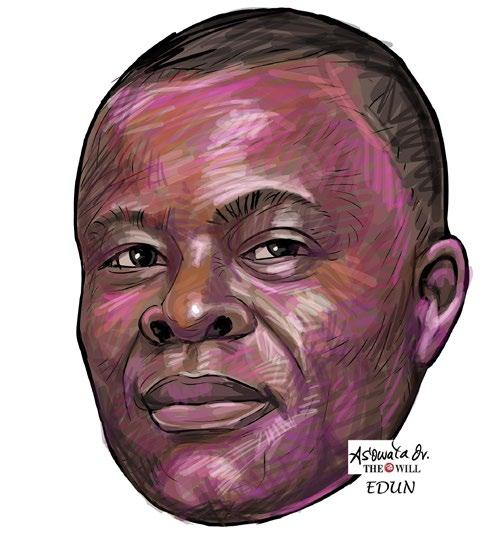
Prominent economy and finance experts have predicted an admixture of gains and pains as the outcome of recent government policies, while navigating the macroeconomic uncertainties in 2025. They also seek robust investment channels to harness emerging opportunities.
The experts who spoke at various fora included analysts at CFG Advisory, a financial services advisory firm; Nairametrics, a business and financial data-based company; Proshare Limited, a professional investment research firm, and Arthur Steven Asset Management Limited (ASAM), a capital market investment management firm.
The experts noted in their various presentations that while the reforminduced policies of 2023-2024 would create a spill-over of stability in foreign exchange and interest rate regimes in 2025, the impact could also result in some economic challenges for the citizens.
According to Mr Ugodre Obi-Chukwu, Managing Director/CEO of Nairametrics, the economy would witness appreciable stability in 2025 after the uncertainties of recent years, but the citizens must brace themselves for the challenges.
However, the Nairametrics CEO pointed out that the huge fiscal deficit in the 2025 budget would lead to massive borrowing, increasing the public debt stock from N130 trillion to N150 trillion. He argued that this would result in rapid depreciation of the naira in the long run and vitiate the income status of the people.
“Forex demand is yet to pick up as Nigerians grapple with massive devaluation. Large fiscal deficit continues, suggesting more exchange rate depreciation in near future.
“Nigeria’s large fiscal deficits, growing debt burden and high inflation rate, pose more threat to exchange rate stability and could rubbish the benefits of ongoing forex reforms.
“Businesses should hedge against a worst-case scenario of N2,200/$1 and take advantage of a best-case scenario of N1,700$1,” he averred.
He added that the inflation rate would decelerate to about 26 percent, but prices will not drop.
In its report titled, ‘Nigeria 2025 Economic Forecast: From Reform Fatigue Quagmire to Sustainable Growth,’ the GFC Advisory noted that Nigeria’s 18-month economic reform programme has yielded mixed results, largely due to poor implementation and putting the cart before the horse.
It noted that the programme’s biggest impact on the economy has been the devaluation of the naira from about 450-1,700 Naira/US$. It argued that the cost-push effect of fuel subsidy removal, worsened the situation in an economy already in stagflation with sharp increases in inflation trajectory. This led to reduced household purchasing power and high interest rates for the firms and the economy.
To exacerbate matters, it said government borrowing has exceeded the US$100 billion mark and debt service costs doubled from N8 trillion in 2024 to N16.3 trillion in the 2025 proposed budget.
“N16.3 trillion in debt servicing is not sustainable, as it exceeds the defense, security, infrastructure, education and health budgets combined at N14 trillion. The gains from the subsidy removal are now being used for debt servicing, instead of investment in capital expenditure that can create stimulus for economic growth,” the firm said in its publication seen by THEWILL, and endorsed by Tilewa Adebajo, the CEO.
“To get the economy back on track (during 2025), the government must reduce its debt burden, restore its credit rating to investment grade and tame inflation. This would reduce borrowing costs and provide stimulus for
“2025 is a year of stability after the variabilities of post-COVID-19 period, followed by the stringent reform agenda of the present Nigerian government,” Obi-Chukwu declared while delivering a lecture at the quarterly forum of the Finance Correspondents Association of Nigeria (FICAN), held in Lagos to review the 2024 economic landscape and forecast the trend in 2025.
Guinness Nigeria reported N20 billion profit, 6 months after Tolaram takeover. The foremost consumer goods firm released its second-quarter earnings last week revealing a pre-tax profit of N20.1 billion for the period ending December 31, 2024.
This marks a significant reversal of fortunes from the pre-tax loss of N8.2 billion reported in the same quarter of the
Continues on page 19

In his lecture titled ‘Nigeria in Transition: Reforms, Global Shifts and Strategic Opportunities’, Obi-Chukwu explained that the monetary policy authorities would go extra mile to maintain a stable forex market, a move he said would attract fortune-hunters to the fixed-income market as investments boom.
The finance analyst said the foreign exchange reform would begin to yield results “as we see a stable rate of N1,700-N1,400/$1during the year on improved liquidity driven by increased oil output as non-oil revenue rises.”


NIGERIA’S LARGE FISCAL DEFICITS, GROWING DEBT BURDEN AND HIGH INFLATION RATE, POSE MORE THREAT TO EXCHANGE RATE STABILITY AND COULD RUBBISH THE BENEFITS OF ONGOING FOREX REFORMS
Continues from page 18
investment, sustainable growth, productivity, and employment.
“To accomplish this, the FGN must restructure its capital structure and balance sheet. Selling down its JV oil assets will raise $30-50 billion, that can be applied to reduce the debt burden, improve the foreign exchange regime, provide dollar supply for naira appreciation, restore credit rating and boost net reserves.” On its part, Proshare demands a clear departure from rhetoric to reality, while strengthening the capital market to play its role in boosting the economy that aims at attaining the $1 trillion target.
In its work titled, ‘Nigeria’s Capital Market Outlook Report 2025: The Capital Market and the Quest for a $1 Trillion Economy’, the firm insists that the market must be repositioned for productivity.
“If Nigeria hopes to achieve a US$1trn by 2030, then the capital market needs major fixing. From US$364bn in 2023 to US$1trn in 2030 implies an annual nominal growth rate of 13 per cent – 15 per cent, with a 2025 Federal Government GDP growth projection of 4.6 per cent; hell would freeze over before Nigeria achieves its desired goal, even with the well-intentioned statistical adjustments of a rebasing of the nation’s total national output.”
The Proshare economists insisted that while the rebasing offers us the incentive of realising how closer we are to bridging the gap between our current state and the quest for a US$1 trillion economy.
According to them, the government needs to accelerate its shift from campaign ground promises to ‘strategic policy action and execution’, insisting that the miracles needed now are the opportunities we create from moments such as this - building momentum that energises markets.
On their part, analysts at Arthur Steven Asset Management Limited (ASAM) said the Nigerian stock market is poised for significant growth in 2025.
of the earning season.
Speaking at the Capital Market Correspondents Association of Nigeria (CAMCAN) 2024 market review and 2025 projection tagged ‘In-Depth Evaluation of the capital market in 2024 and prognosis for 2025’ held in Lagos, the former President of the Chartered Institute of Stockbrokers (CIS) noted that the forecast was underpinned by factors like the ongoing bank recapitalisation efforts, new equity listings, and anticipated monetary policy easing by the Central Bank of Nigeria (CBN).
Amolegbe in his presentation titled, ‘2024 Review and Outlook for 2025: Navigating Uncertainty, Unlocking Growth,’ highlighted Nigeria’s relative market attractiveness as a key factor behind increased foreign portfolio inflows (FPI), provided stable policies are maintained.
He noted that the bank recapitalization process is set to boost investor confidence, while high-profile listings such as Dangote Refinery are expected to enhance market liquidity and broaden investment opportunities.
The projected bullish trend in 2025 comes as investors position themselves ahead of 2024 fiscal year results and dividend declarations, particularly in the banking sector.
However, Amolegbe cautioned that the market’s performance will depend on critical factors such as the country’s economic growth trajectory, monetary policy direction, and corporate earnings results.
ASAM anticipates a shift toward equities as fixed-income yields decline, driven by the CBN’s likely adoption of a more accommodative monetary stance.
Continues from page 18
previous year.
It is also the first quarterly profit posted by Guinness Nigeria Plc since September 2023, when it reported a profit of N3.8 billion in its first quarter.
Transcorp Power Plc achieved remarkable milestones in its fiscal year 2024, showcasing strong growth in revenue and profitability.
According to its audited results submitted to the Nigerian Exchange (NGX) last week, the company recorded a 114.71 percent year-onyear (YoY) growth in profit before tax, reaching N113.287 billion.
Revenue surged to N305.9 billion, reflecting an impressive 115.27 percent Y-o-Y growth.
the Exchange, in contrast to a total of 2.252 billion shares valued at N58.831 billion that exchanged hands the previous week in 63,657 deals.
The Financial Services Industry (measured by volume) led the activity chart with 2.336 billion shares valued at N33.014 billion traded in 27,100 deals; thus contributing 74.59% and 43.13% to the total equity turnover volume and value respectively.
The Services industry followed with 284.988 million shares worth N807.646 million in 4,638 deals. Third place was the Consumer Goods Industry, with a turnover of 139.010 million shares worth N5.704 billion in 6,469 deals.
“We are going to see more of the aggressive hunters’ move towards the strong firms as they release their reports and declare dividend in the first quarters”, said Magnus Oyims, a financial market analyst.
According to Olatunde Amolegbe, Managing Director of ASAM, the firm projects a 39 percent return on the All-Share Index (ASI) in 2025, as investors take position with the advent
TDespite lingering concerns over exchange rate volatility and inflation, strategic sectors such as banking, consumer goods, and industrials are expected to perform well, offering steady returns for investors. Overall, the 2025 outlook for the Nigerian stock market remains optimistic, bolstered by strategic reforms, policy adjustments, and improving investor confidence.
While challenges such as exchange rate instability and inflation persist, key sectors are positioned to drive market performance and deliver strong returns for investors.
ranscorp Power Plc achieved remarkable milestones in its fiscal year 2024, showcasing strong growth in revenue and profitability.
According to its audited results submitted to the Nigerian Exchange (NGX), the company recorded a 114.71 percent year-on-year (YoY) growth in profit before tax, reaching N113.287 billion. Revenue surged to N305.9 billion, reflecting an impressive 115.27 percent Y-o-Y growth.
Demonstrating its commitment to shareholder value, the Board of Directors has proposed a final dividend of N3.50 per ordinary share, which when combined with the interim dividend of N1.50k paid at half-year, brings the total dividend for the 2024 financial year to N5.00k per ordinary share.
Revenue haul hits N305.944 billion representing a 115.27 percent jump as Cost of sales: jumped to N163.734 billion or a 145.48 percent growth year-onyear.
of N80.013 billion or 164.65 percent increase, with Earnings per share climbing to N10.67, a 164.76 percent surge.
Total Assets of the firm during the review period was N396.782 billion as Total Equity hit N126.626 billion representing a 77.62 percent and 118.84 percent rise respectively.
Commenting on the results, Emmanuel N. Nnorom, Chairman, of Transcorp Power, emphasised the Company’s focus on stakeholder value:
“Transcorp Power has become one of Nigeria’s most formidable power operators, committed to bridging the energy gap in the country and contributing to the nation’s economic growth. This financial performance reflects our unwavering commitment to our shareholders and stakeholders.
A total turnover of 3.132 billion shares worth N76.552 billion in 61,456 deals was traded last week by investors on the floor of
metrics, aligning with our mission to deliver value. We are confident in our ability to sustain this trajectory of success.”
The substantial growth in pre-tax profit can be attributed to the growth in revenue driven by the growth in Energy delivered, which accounts for over 67percent of total revenue.
Cost of sales grew higher relative to revenue, driven by 168 percent Y-o-Y growth in Natural gas and fuel reaching N150.971 billion.
Total assets grew by 78 percent to reach N396.782 billion an indication of the strength of the company even in challenging times.
Overall Transcorp Power Plc FY 2024 performance, marked by significant growth in revenue, profitability, and operational efficiency is highly encouraging.
Trading in the top three equities namely Wema Bank Plc, Secure Electronic Technology Plc and Access Holdings Plc (measured by volume) accounted for 1.437 billion shares worth N15.406 billion in 5,292 deals, contributing 45.89 percent and 20.13 percent to the total equity turnover volume and value respectively.

The firm’s Gross profit increase of 88.55 percent reflected in N142.210 billion rise as Admin expenses was N20.019 billion indicating a 131.91 percent jump.
On the same growth trajectory, Operating profit was N114.031 billion, constituting a 76.45 percent increase, as Finance cost recorded a 28.13 percent jump to N9.858 billion.
The power generating firm posted a Profit after tax


“We remain steadfast in our pursuit of value creation and assure our investors of continued robust returns. I am proud of how our organisation faced and responded to a particularly challenging market and macroeconomic environment and our future is bright.”
Also, speaking on the performance, the Chief Executive Officer, of Transcorp Power, Peter Ikenga, attributed the results to the Company’s strategic investments and a deliberate focus on enhancing operational efficiencies.
He said: “Transcorp Power is dedicated to financial discipline and delivering unparalleled value to our stakeholders. Since our public listing, we have maintained consistent growth across all financial
Despite the notable increase in the cost of sales , driven by rising natural gas and fuel expenses, the company maintained strong profitability metrics, evidenced by an 88.55 percent growth in gross profit and a 164.65 percent surge in profit after tax.
This strong performance is further highlighted by the improved returns on assets (20.17 percent) and equity (63.19 percent), signalling enhanced efficiency in asset and equity utilization.
Transcorp Power Plc, a subsidiary of Transnational Corporation Plc, contributes over 20% of Nigeria’s installed electricity capacity through its operations at

As part
and creating value across Nigeria.
The company’s performance should pose a huge confidence in Nigerians to have the narrative of epileptic power sector reversed.

BY KINGSLEY NDUBUEZE AYOZIE
Early last month, it was widely reported in the media that the Office of the Auditor-General of the Federation (AGF) uncovered alarming irregularities in contract payments amounting to billions of Naira across various ministries, departments and agencies (MDAs) within the country.
According to the findings detailed in the Auditor-General’s Annual Report on Non-Compliance and Internal Control Weaknesses for 2020-2021, significant contract fraud was revealed, involving some notable governmental agencies.
The violations, covering activities between the years 2020 and 2021, included irregular payments for contracts and payments for jobs that were either partially executed or not executed at all.
In the light of these public financial irregularities—and many more yet to be uncovered—this article seeks to explore possible measures or strategies to curb, if not totally eradicate, the growing incidence of contract scams, which are becoming increasingly prominent across different sectors.
Some of the measures to address this menace can be proactive (preventive processes) or reactive (detective processes) – due process.
The concept of due process officially entered the Nigerian governance framework in 2007, following the enactment of the Due Process Review and Public Procurement Act of 2007.
It is a term widely used in public governance literature to stipulate that government businesses and activities, such as contract awards, should be conducted in an open, economical and transparent manner, devoid of favouritism or corrupt tendencies.
Openness implies that the tendering process must be accessible to all, without bias toward any particular person or group. Economic considerations mean that the process must prioritise cost-effectiveness while maintaining high quality.
Transparency ensures the bidding process is non-restrictive, inclusive, and accessible from start to finish.
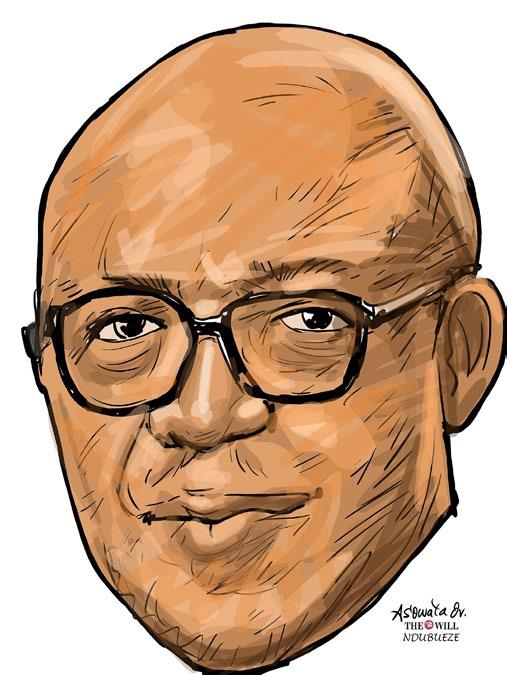
Freedom from favouritism means the bidding process must be impartial, free from sentimental attachments or undue influence. Finally, corruptionfree execution requires the process to be insulated from gratification or financial inducements in any form.
Another perspective sees due process as a mechanism certifying that only projects meeting all requirements are funded while promoting adherence to international competitive bidding standards.
In Nigeria, the Budget Monitoring and Price Intelligence Unit (BMPIU) is tasked with ensuring compliance with due process. Its primary objective is to promote fiscal transparency and adherence to government guidelines on budgeting and
procurement of facilities or contract services at the most affordable cost.
Additional objectives include ensuring procurement rules and procedures are implementable and enforceable.

For due process mechanisms to thrive in government and public sector entities, several factors must be operational. A well-structured internal control system must be deployed alongside effective financial controls. Adherence to budgets and budgetary controls is essential, as is efficient expenditure management.
The system must aim to eliminate leakages, wastages, and mismanagement while ensuring open and transparent revenue collection processes. Proper record-keeping and regular external audits of government records and books are crucial.
Moreover, government employees must be reoriented to comply with ethical codes of conduct. All government procurements should be properly advertised before their review by the BMPIU. Lastly, a robust judicial system is necessary to prosecute public officials involved in financial misconduct, serving as a deterrent to others.
The adoption of the due process mechanism by the government and its functionaries, alongside all ministries, departments, and agencies (MDAs), offers numerous benefits. It significantly reduces contract inflation, leading to cost savings through BMPIUreviewed contracts.
According to the findings detailed in the AuditorGeneral’s Annual Report on Non-Compliance and Internal Control Weaknesses for 20202021, significant contract fraud was revealed, involving some notable governmental agencies

It also creates a level playing field for all contract bidders and promotes strict adherence to international competitive bidding processes, ensuring efficient contract execution. Furthermore, it helps reorient contract bidders and the general public to ensure that government activities are conducted openly, economically, and transparently.
•Ayozie is an advocate of good governance and a chartered accountant

BY JUDE ENAJERO
Small and Medium Enterprises (SMEs) are the backbone of Nigeria’s economy. According to the Small and Medium Enterprises Development Agency of Nigeria (SMEDAN), SMEs account for 96 percent of businesses, contribute 48 percent to the nation’s GDP and employ 84 percent of Nigeria’s workforce. Yet, despite their enormous potential, these businesses face numerous challenges—poor infrastructure, limited access to finance, and market volatility among them.
In an increasingly globalised and environmentally conscious world, embracing Environmental, Social and Governance (ESG) principles could hold the key to their sustainability.
WHY ESG MATTERS FOR NIGERIAN SMES
ESG is more than a buzzword. It represents a framework for businesses to balance profit with purpose by addressing environmental risks, social impacts and ethical governance. For SMEs in Nigeria, integrating ESG practices can open doors to new funding opportunities, improve resilience against climate-related risks and attract ethically minded customers.
Globally, investors are increasingly prioritising ESG-compliant businesses. In Nigeria, this shift is evident. According to the Nigerian Exchange Group (NGX), sustainable finance raised through green and sustainability-linked bonds surged to over $1.5 billion between 2019 and 2023.
This trend offers SMEs an untapped opportunity to secure affordable financing by embedding ESG principles into their operations.
For example, consider Farmforte, an agribusiness startup that emphasises sustainable farming. By focusing on renewable energy and efficient water usage, Farmforte attracted significant funding from international investors.

Similarly, SMEs in other sectors can explore sustainability-linked loans, which often come with lower interest rates for meeting environmental or social impact targets.
CLIMATE ADAPTATION AND RISK MITIGATION
Climate change poses a growing threat to Nigeria’s economy, particularly for SMEs. Erratic rainfall patterns, floods and droughts disrupt supply chains and agricultural productivity. According to the Nigerian Meteorological Agency, flooding alone caused $1.5 billion in losses in 2022, disproportionately affecting small businesses. Adopting ESG practices can help SMEs mitigate these risks. For instance, incorporating renewable energy solutions like solar panels can reduce dependence on erratic grid power, while efficient waste management can minimise environmental liabilities.
SMEs that prioritise climate adaptation are not just safeguarding their future but also contributing to Nigeria’s climate goals under the Paris Agreement.
Social factors are at the heart of Nigeria’s development challenges. High unemployment rates, gender inequality, and inadequate education systems hinder economic progress. SMEs have a unique role to play in addressing these issues.
Take Shecluded, a Nigerian fintech startup dedicated to empowering women entrepreneurs. By providing tailored financial products and mentorship, Shecluded has helped thousands of women scale their businesses. Initiatives like these demonstrate that SMEs can create social impact while remaining profitable.
Furthermore, businesses that invest in fair labour practices and community development often enjoy higher employee loyalty and customer trust.
Governance—the “G” in ESG—is critical for building investor confidence. Transparent operations, ethical practices, and sound financial reporting are nonnegotiable for SMEs aiming to scale globally.
For example, Flutterwave, a leading Nigerian fintech, gained international recognition partly due to its robust governance framework. While challenges like regulatory scrutiny remain, the company’s adherence to global standards has positioned it as a beacon of African innovation. SMEs that prioritise good governance can similarly attract partnerships and funding from global institutions.
THE CHALLENGES OF ESG ADOPTION
While the benefits of ESG are clear, implementing these practices isn’t without hurdles. Many Nigerian SMEs operate in a challenging environment where power outages, limited infrastructure, and high operating costs are the norm. Adding ESG compliance may seem like an additional burden. Moreover, awareness remains low. A 2022 survey by PwC Nigeria revealed that 62per cent of SMEs were unfamiliar with ESG principles, highlighting the need for targeted education and capacity-building initiatives.
SOLUTIONS TO DRIVE ESG ADOPTION

Policy Support: The Nigerian government can play a pivotal role by offering incentives for ESG-compliant businesses. Tax breaks, grants, and subsidised loans can encourage SMEs to adopt sustainable practices. Capacity Building: Organisations like SMEDAN and the Nigerian Economic Summit Group (NESG) can collaborate with international bodies to provide training and resources on ESG integration.
Public-Private Partnerships: Multinational companies operating in Nigeria can support SMEs through mentorship and supply chain integration. For instance, Unilever Nigeria’s “Partner to Win” program helps suppliers meet global sustainability standards.
Leveraging Technology: Digital tools can simplify ESG reporting and monitoring. Startups like CarbonCheck offer affordable solutions for tracking carbon footprints, making it easier for SMEs to measure and improve their environmental impact.
According to the Nigerian Meteorological Agency, flooding alone caused $1.5 billion in losses in 2022, disproportionately affecting small businesses
The path to sustainability for Nigerian SMEs lies in their ability to adapt to global trends. ESG is not just an ethical imperative; it is a business opportunity. By embedding ESG principles into their operations, SMEs can enhance their resilience, attract investment, and contribute meaningfully to Nigeria’s economic development.
Nigeria’s SMEs have weathered countless storms, from economic recessions to the COVID-19 pandemic. Embracing ESG could be the lifeline they need to thrive in an increasingly competitive and environmentally conscious world. The journey won’t be easy, but the rewards—for businesses, communities, and the planet—are well worth the effort.
• Enajero is a finance professional and Assistant Vice President at Citigroup
Photo Editor: Peace Udugba [08033050729]

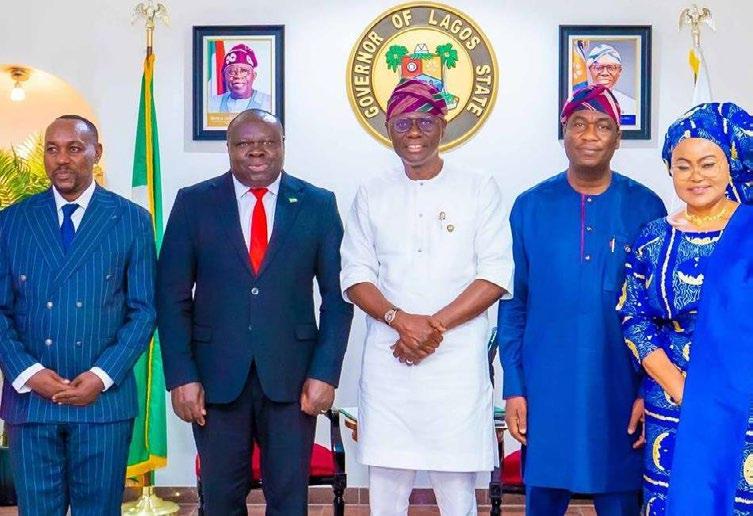
First Lady of Nigeria, Sen. Oluremi Tinubu (middle); Minister of Youth Development, Comrade Ayodele Olawande (3rd left); Director-General, National Youth Service Corps (NYSC), Brig.-Gen. Yusha’u Ahmed (3rd right); Minister of State for FCT, Dr. Mariya Mohmoud and others, during the official commissioning of the digitalised NYSC Museum and Television Studio in Abuja on January 23, 2025.

L-R: National Chairman, Independent Petroleum Marketers Association of Nigeria (IPMAN), Alhaji Abubakar Shetima; newly sworn-in Western Zone Chairman of IPMAN, Chief Oyewole Akanni; his predecessor, Alhaji Dele Tajudeen and IPMAN Coordinator, National Supplies, Alhaji Zarma Mustapha, during the swearing in of Chief Akanni at the Annual General Meeting/Elections 2025 of IPMAN in Ibadan on January 21, 2025.

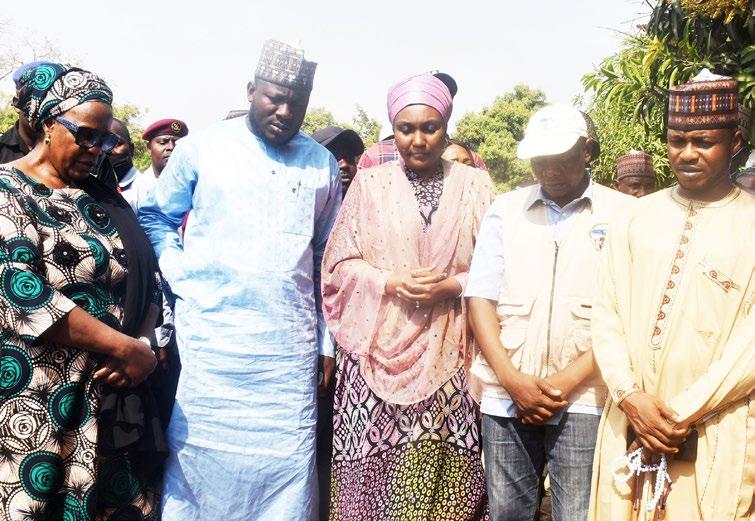
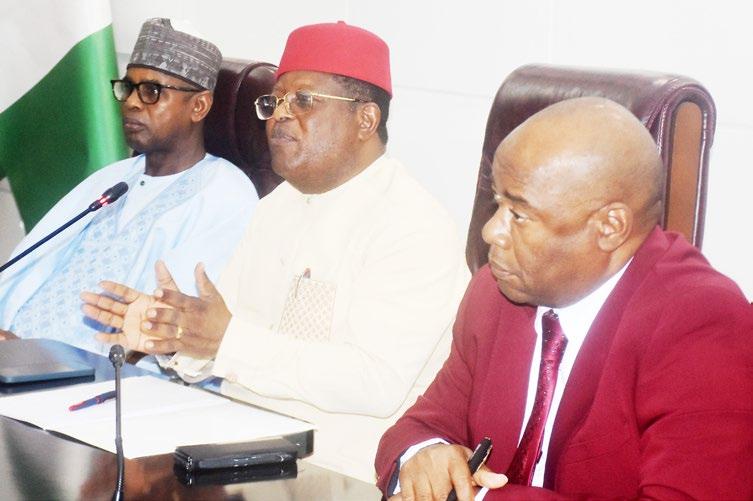






BY JUDE OBAFEMI
Oba Femi, whose real name is Isaac Odugbesan, has emerged as a formidable figure in the world of professional wrestling, despite his roots being far from the squared circle. Born in the bustling city of Lagos, Nigeria, Femi transitioned from a celebrated shotput athlete to a WWE superstar. His journey from the track fields of Alabama, where he clinched multiple championships, to the highenergy environment of WWE’s NXT brand is a testament to his athletic discipline and unwavering adaptability.
Now known for his imposing presence and championship pedigree, Femi has not only won the NXT North American Title but also claimed the NXT Championship, making history as the first graduate of WWE’s Next-In-Line programme to achieve such heights. His story is one of passion, cultural pride, and an unyielding drive to succeed on the global stage.
Femi’s early life was steeped in athleticism. As a high school student, he shone in shot put, a sport that would later pave his way to international recognition. His talent on the field earned him a scholarship to Middle Tennessee State University, where he not only competed but also clinched the Conference USA title in shot put. Seeking to further his athletic career, Femi transferred to the University of Alabama in 2019. Here, he added to his accolades by winning the SEC Indoor Track and Field Championships for shot put in 2021 and 2022, followed by

securing the outdoor title in his final year.
The transition from track to wrestling was not a direct one. Femi’s entry into WWE came via the Next in Line (NIL) programme in December 2021, where WWE scouts college athletes with the potential for professional wrestling. This move introduced Femi to a world where physicality met performance art, a challenging yet rewarding shift.
Femi debuted as Oba Femi in WWE on November 18, 2022, on NXT Level Up, facing off against Dante Chen, but it was his formal debut at NXT’s Spring Breakin’ in April 2023 where he claimed his first victory, defeating Oro Mensah. After a period off television, Femi returned with a bang, winning the NXT Men’s Breakout Tournament in January 2024. This victory was not just a win but a gateway to championship gold, as he cashed in his tournament contract to defeat Dragon Lee and capture the NXT North American Championship.
His championship tenure was nothing short of historic. Femi held the title for 273 days, setting a new record for the longest reign, until he was dethroned by Tony D’Angelo. However, Femi’s journey did not end there. At NXT Deadline in December 2024, he triumphed in the Iron Survivor Challenge, which earned him a shot at the NXT Championship. On January 7, 2025, in a triple threat match at NXT: New Year’s Evil, Femi defeated both Trick Williams and Eddy Thorpe to become the NXT Champion.

The cultural implications of Femi’s success are profound. For Nigerians, his achievements are a beacon of what is possible. His story resonates with many back home, where he is seen not just as an athlete but as a cultural icon who has broken through in a field traditionally dominated by others. His family, initially focused on his academic achievements, have now become his biggest supporters, understanding and celebrating his wrestling career’s nuances and triumphs.
Femi’s connection with his roots is evident in how he carries himself in the ring and the media. He speaks with humility about his Nigerian background, often attributing his success to the support and teachings from his family and community. His wrestling style, a blend of brute strength and strategic finesse, has made him a standout

performer in NXT, earning him a growing fanbase that appreciates his authenticity and skill.
Beyond his physical accomplishments, Femi’s journey into wrestling highlights his adaptability. Moving from the structured environment of college sports to the unpredictable and theatrical world of wrestling required learning new skills, from in-ring psychology to connecting with audiences. His quick grasp of these aspects has been noted by WWE officials, who see in him not just current success but untapped potential for the future.
Femi’s impact also extends to the broader wrestling community, where he is viewed as part of a new generation of athletes bringing diversity and fresh perspectives to the sport. His presence in WWE has sparked conversations about representation, offering fans from different backgrounds a figure to rally behind. His influence is also felt in Nigeria, where his success story will continue to inspire many young athletes to pursue unconventional paths. Schools and sports clubs have to begin to look at wrestling as a viable career, spurred by Femi’s achievements. Social media from Nigeria to the global wrestling community is abuzz with posts celebrating his wins, his resilience, and his representation of African athletes on a major international stage.
Moreover, Femi’s story is a testament to the power of perseverance. His transition from track to wrestling involved not just physical retraining but a mental shift to embrace the storytelling aspect of wrestling. His performances are not just about winning matches but about engaging fans, creating memorable moments, and building a persona that resonates with a wide audience. In interviews, Femi often speaks about his journey’s challenges and rewards, emphasising the importance of staying true to oneself while adapting to new environments. His approach has been to keep learning, keep growing, and keep pushing boundaries, both in his personal life and professional career.
In truth, Femi’s ascent in WWE is a narrative of triumph over traditional paths, showing how one can redefine success through hard work and cultural pride. His story is not merely about wrestling; it is about breaking barriers, inspiring a new generation, and proving that the spirit of Lagos, nay Nigeria, can indeed conquer the world’s biggest wrestling stage. His journey is a powerful reminder that with determination and passion, the possibilities are limitless, making him not just a champion in the ring, but a champion for many hearts and minds around the globe.
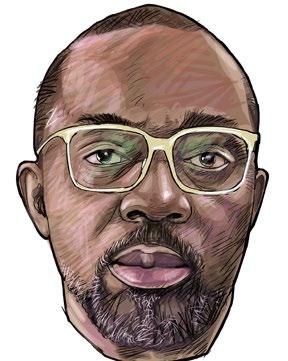

ogannah@thewillnews.com
The Nigerian telecommunications landscape is set to undergo a seismic shift with the Nigerian Communications Commission’s recent approval of a 50 percent tariff increase, a decision that has sparked public outcry and potential industrial action. At the heart of this controversy stands the Nigeria Labour Congress (NLC), which has not only condemned the move but also seriously contemplating a nationwide boycott of telecom services.
The tariff adjustment promises to be punishing for the average Nigerian consumer. Call rates will surge from N11-N12 to N16.50-N18 per minute, SMS charges will climb from N4 to N6, and data costs will jump from N300 to over N400 per gigabyte.
The hike is coming at a time of profound economic vulnerability, where the minimum wage worker earning N70,000 monthly could see their telecommunications expenses rise from N7,000 to N10,500 — a substantial 15 per cent bite into their already stretched income.
Telecom operators argue that the increase is inevitable, pointing to a justifiable perfect storm of escalating operational costs driven by persistent inflation and volatile foreign exchange rates. They contend that without this adjustment, service quality would deteriorate and critical infrastructure investments would become unsustainable. However, this argument rings hollow for most Nigerians who are already struggling with mounting economic pressures.
NLC President, Joe Ajaero, has been particularly vociferous in his criticism, characterising the tariff hike as a direct assault on the welfare of Nigerian workers. In passionate statements, he has questioned the government’s priorities, drawing a sharp contrast between the rapid approval of telecom price increases and the glacial pace of minimum wage negotiations.
The NLC’s response goes beyond mere rhetoric; it is seriously considering a comprehensive boycott that could potentially paralyse communication infrastructure across the country.
The potential consequences of such a boycott are profound. Beyond the immediate disruption of communication channels, there are significant economic implications. The telecommunications sector is a crucial contributor to Nigeria’s GDP and a magnet for foreign direct investment. A successful

boycott could send ripple effects through the economy, potentially deterring investors and slowing economic productivity.
Public sentiment has been overwhelmingly negative. Social media platforms are awash with expressions of frustration, with many supporting the NLC’s stance. The general perception is that this tariff increase disproportionately affects low-income earners and small businesses, who rely heavily on telecommunications for both personal and professional communication.
The Federal Competition and Consumer Protection Commission (FCCPC) has attempted to provide some reassurance, emphasising that any tariff increase must translate into tangible service improvements. However, given historical precedents, many Nigerians remain skeptical. The National Association of Telecommunications Subscribers (NATCOMS) has opted for a different approach, choosing legal action over public protests, which suggests a strategic attempt to challenge the increase through regulatory frameworks. What makes this situation particularly complex is
the delicate balance the government must maintain. On one side are the telecom operators arguing for financial sustainability and on the other are consumers and labour unions demanding affordable communication services. The NCC’s defence that the increase is necessary for sector sustainability provides little comfort to those already struggling with rising living costs.
The economic ramifications extend beyond immediate communication expenses. Reduced digital access could hamper educational opportunities, limit business communications and potentially exacerbate existing economic inequalities. For many Nigerians, especially those in remote areas or running small enterprises, telecommunications are not a luxury but a critical lifeline for economic participation.
Interestingly, the telecom companies themselves are caught in a precarious position. While they argue for the necessity of the price increase, they risk alienating their customer base and potentially triggering a widespread boycott that could cause more financial damage than the current economic challenges. The delicate ecosystem of telecommunications in Nigeria requires a nuanced approach that balances corporate sustainability with consumer welfare.
At the moment, all eyes are on the key stakeholders: the NCC, telecom operators, the NLC, and the federal government. The resolution of this conflict could point to the level of compromises each player is ready to make, how essential services are priced and how consumer rights are protected in Nigeria’s increasingly complex economic landscape.
The coming weeks could therefore be critical. Will the government engage in meaningful dialogue? Will the NLC follow through with its boycott threat? Will telecom operators reconsider the extent of their proposed increases? These questions hang in the air, symbolising the broader struggle between corporate interests and social welfare in contemporary Nigeria.
What is certain is that this telecommunications tariff controversy is more than just a pricing dispute. It is a microcosm of the larger economic challenges facing Nigeria: the tension between necessary economic adjustments and the protection of citizen welfare, the role of labour unions in economic policy, and the ongoing struggle for economic justice in a rapidly tightening socio-economic environment.
The general perception is that this tariff increase disproportionately affects low-income earners and small businesses, who rely heavily on telecommunications for both personal and professional communication